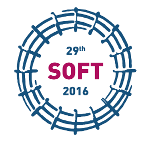Speaker
Christian Day
(Karlsruhe Institute of Technology (KIT))
Description
In the framework of the EUROfusion DEMO Programme and its work package Tritium-Matter Injection-Vacuum (TFV), the EU is preparing the conceptual design of the inner fuel cycle of a pulsed fusion DEMO. This contribution presents the current status of the project, addresses the most demanding challenges and shows first results.
The project was started in 2014. The first one and a half years were devoted to the development and application of a systems engineering approach to find the most suitable concept to meet the functional needs, in particular the necessity to minimise the tritium inventory. As a result, a novel architecture was derived, which features an innermost direct internal recycle loop as shortcut between the divertor pumping and the pellet injectors, a second loop inside the tritium plant without complete separation of the hydrogen isotopes, and the classical outer loop with full separation of the different hydrogen isotopologues.
Based on that, individual R&D programmes have been launched in the different sub-areas of tritium plant inner and outer systems, core fuelling and gas injection, and vacuum pumping (NBI and torus). In a recent exercise, the R&D plan has been extended in full detail until 2020.
This paper will start with an outline of the R&D strategy and a discussion on the uncertainty in the requirements and assumed input parameters from other DEMO work packages. It will then highlight first results for all sub-systems. This includes modelling examples for isotope separation in the tritium plant, open loop modelling of pellet injection, and simulation of metal foil and diffusion vacuum pumps. For tritium and matter injection, experimental plans will be presented, whereas in the area of vacuum pump development results from validation experiments will be reported. Finally, first results of an integrated fuel cycle simulation exercise will be shown.
Co-authors
A. Frattolillo
(ENEA, Frascati, Italy)
A. Hollingsworth
(Culham Science Centre (CCFE), Abingdon, United Kingdom)
A. Santucci
(ENEA, Frascati, Italy)
B. Butler
(Culham Science Centre (CCFE), Abingdon, United Kingdom)
B. Pegourie
(CEA Cadarache, Saint-Paul-lez-Durance, France)
B. Peters
(Karlsruhe Institute of Technology (KIT), Karlsruhe, Germany)
B. Ploeckl
(Max-Planck-Institute of Plasma Physics (IPP), Garching, Germany)
C. Moreno
(CIEMAT, Madrid, Spain)
Christian Day
(Karlsruhe Institute of Technology (KIT), Karlsruhe, Germany)
D. Whittaker
(Culham Science Centre (CCFE), Abingdon, United Kingdom)
E. Sartori
(Consorzio RFX, Padova, Italy)
F. Cismondi
(EUROfusion Consortium Programme Management Unit, Garching, Germany)
H. Strobel
(Karlsruhe Institute of Technology (KIT), Karlsruhe, Germany)
M. Gethins
(Culham Science Centre (CCFE), Abingdon, United Kingdom)
M. Rollig
(Karlsruhe Institute of Technology (KIT), Karlsruhe, Germany)
M. Scannapiego
(Karlsruhe Institute of Technology (KIT), Karlsruhe, Germany)
P. Sonato
(Consorzio RFX, Padova, Italy)
P. T. Lang
(Max-Planck-Institute of Plasma Physics (IPP), Garching, Germany)
R. J. Walker
(Culham Science Centre (CCFE), Abingdon, United Kingdom)
R. Lawless
(Culham Science Centre (CCFE), Abingdon, United Kingdom)
R. Shaw
(Culham Science Centre (CCFE), Abingdon, United Kingdom)
S. A. Medley
(Culham Science Centre (CCFE), Abingdon, United Kingdom)
S. Hanke
(Karlsruhe Institute of Technology (KIT), Karlsruhe, Germany)
S. Naris
(Hellenic Association - University of Thessaly, Volos, Greece)
S. Ochoa
(Karlsruhe Institute of Technology (KIT), Karlsruhe, Germany)
S. Tosti
(ENEA, Frascati, Italy)
S. Varoutis
(Karlsruhe Institute of Technology (KIT), Karlsruhe, Germany)
T. Giegerich
(Karlsruhe Institute of Technology (KIT), Karlsruhe, Germany)
X. Luo
(Karlsruhe Institute of Technology (KIT), Karlsruhe, Germany)
Y. Horstensmeyer
(Karlsruhe Institute of Technology (KIT), Karlsruhe, Germany)
Y. Igitkhanov
(Karlsruhe Institute of Technology (KIT), Karlsruhe, Germany)

